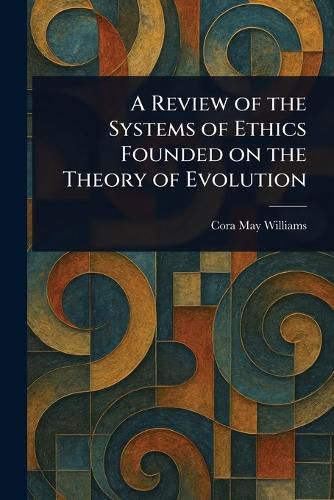Readings Newsletter
Become a Readings Member to make your shopping experience even easier.
Sign in or sign up for free!
You’re not far away from qualifying for FREE standard shipping within Australia
You’ve qualified for FREE standard shipping within Australia
The cart is loading…






This title is printed to order. This book may have been self-published. If so, we cannot guarantee the quality of the content. In the main most books will have gone through the editing process however some may not. We therefore suggest that you be aware of this before ordering this book. If in doubt check either the author or publisher’s details as we are unable to accept any returns unless they are faulty. Please contact us if you have any questions.
Explore the intersection of Darwinism and moral philosophy in C. M. Williams' "A Review of the Systems of Ethics Founded on the Theory of Evolution." This thought-provoking work delves into evolutionary ethics, examining how the principles of natural selection might shape our understanding of right and wrong. Williams meticulously analyzes ethical systems that attempt to ground morality in evolutionary theory, offering a critical perspective on the implications of Darwinism for social Darwinism and broader philosophical debates.
A significant contribution to the field of moral philosophy, this book provides a valuable historical overview of attempts to reconcile science and ethics. It presents a detailed examination of the philosophical challenges inherent in deriving moral imperatives from the processes of evolution. Ideal for readers interested in the history of ideas, "A Review of the Systems of Ethics Founded on the Theory of Evolution" remains a relevant and insightful exploration of enduring questions about human nature and the foundations of morality.
This work has been selected by scholars as being culturally important, and is part of the knowledge base of civilization as we know it.
This work is in the public domain in the United States of America, and possibly other nations. Within the United States, you may freely copy and distribute this work, as no entity (individual or corporate) has a copyright on the body of the work.
Scholars believe, and we concur, that this work is important enough to be preserved, reproduced, and made generally available to the public. We appreciate your support of the preservation process, and thank you for being an important part of keeping this knowledge alive and relevant.
$9.00 standard shipping within Australia
FREE standard shipping within Australia for orders over $100.00
Express & International shipping calculated at checkout
This title is printed to order. This book may have been self-published. If so, we cannot guarantee the quality of the content. In the main most books will have gone through the editing process however some may not. We therefore suggest that you be aware of this before ordering this book. If in doubt check either the author or publisher’s details as we are unable to accept any returns unless they are faulty. Please contact us if you have any questions.
Explore the intersection of Darwinism and moral philosophy in C. M. Williams' "A Review of the Systems of Ethics Founded on the Theory of Evolution." This thought-provoking work delves into evolutionary ethics, examining how the principles of natural selection might shape our understanding of right and wrong. Williams meticulously analyzes ethical systems that attempt to ground morality in evolutionary theory, offering a critical perspective on the implications of Darwinism for social Darwinism and broader philosophical debates.
A significant contribution to the field of moral philosophy, this book provides a valuable historical overview of attempts to reconcile science and ethics. It presents a detailed examination of the philosophical challenges inherent in deriving moral imperatives from the processes of evolution. Ideal for readers interested in the history of ideas, "A Review of the Systems of Ethics Founded on the Theory of Evolution" remains a relevant and insightful exploration of enduring questions about human nature and the foundations of morality.
This work has been selected by scholars as being culturally important, and is part of the knowledge base of civilization as we know it.
This work is in the public domain in the United States of America, and possibly other nations. Within the United States, you may freely copy and distribute this work, as no entity (individual or corporate) has a copyright on the body of the work.
Scholars believe, and we concur, that this work is important enough to be preserved, reproduced, and made generally available to the public. We appreciate your support of the preservation process, and thank you for being an important part of keeping this knowledge alive and relevant.